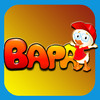Bilingual Articulation Phonology Assessment: English/Spanish
Detailed App Info:
Application Description
The BAPA aids in obtaining a complete picture of a child’s overall speech sound abilities by assessing and analyzing errors according to both articulation errors and phonological errors. A child may have difficulties with the movement of the speech mechanisms to produce a sound (articulation), with under-standing and applying the correct phonological rules or patterns for production (phonology), or a combi-nation of both. An understanding of the specific types of errors made by a child will result in an intervention plan that can more appropriately target the child’s underlying speech deficiency.
A near-native proficiency in both oral and written Spanish is needed to administer the BAPA. Knowl-edge of the (1) words and the (2) sounds of the language spoken by the child enables an examiner to cor-rectly identify which errors have been produced. When synonyms or dialectal variations are produced during testing (e.g., producing playera for camisa [shirt]), a high level of proficiency in Spanish will enable the examiner to direct the child to produce the target while still validating his or her response. This can also be particularly important for a child with highly unintelligible speech, who may produce the dialec-tal variation in error. Understanding that the intended word began with an initial /p/ (playera) will pre-vent the examiner from marking the initial sound as an error of fronting (i.e., /p/ replacing the /k/ for camisa) when /p/ was correct for the intended word.
Features of the BAPA
The Bilingual Articulation and Phonology Assessment evaluates the production of 50 Spanish phonemes and consonant clusters in 109 instances across 49 words. It is the first and only test in Spanish to account for multiple occurrences of sounds in each position of a word and for production of longer multisyllabic Spanish words independently. Additionally, the BAPA provides a method for tabulating phonological and articulatory productions and will automatically generate a report. Phonemes in all positions are test-ed more than once in order to calculate a percentage of accuracy.
When a child does not produce /k/ in cama, is it because he cannot produce initial /k/, because he is un-familiar with the word cama, or because he was distracted when this test item was administered? Was the erroneous production affected by neighboring phonemes that influenced the production of /k/ for this word (assimilation) that would not affect production in other target words? By probing each item multi-ple times, the BAPA is able to produce a percentage of accuracy for each phoneme in each position. This gives a child multiple opportunities to produce a sound without assuming that the sound cannot be pro-duced when targeted in a single, possibly unfamiliar, position.
Requirements
Your mobile device must have at least 110.43 MB of space to download and install Bilingual Articulation Phonology Assessment: English/Spanish app. Bilingual Articulation Phonology Assessment: English/Spanish was updated to a new version. Purchase this version for $49.99
If you have any problems with installation or in-app purchase, found bugs, questions, comments about this application, you can visit the official website of Smarty Ears Smarty Ears, LLC at http://www.smartyearsapps.com.
Copyright © All rights reserved to Smarty Ears Apps, LLC



